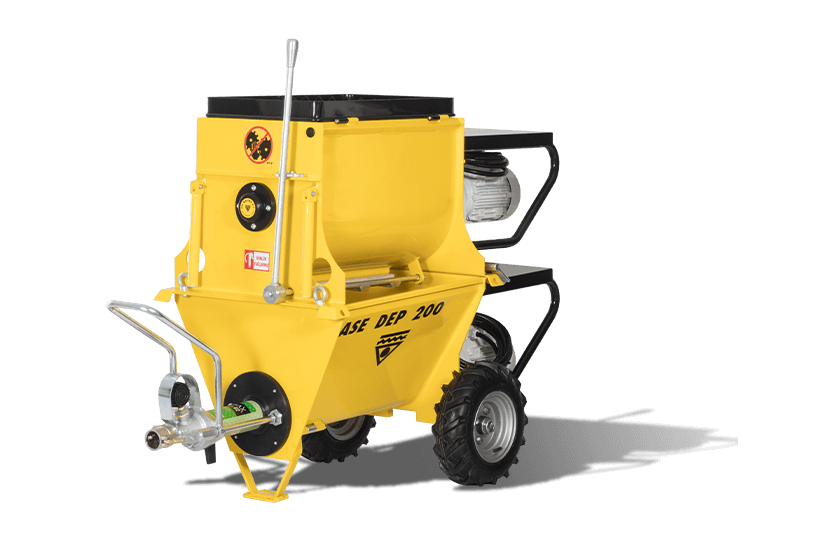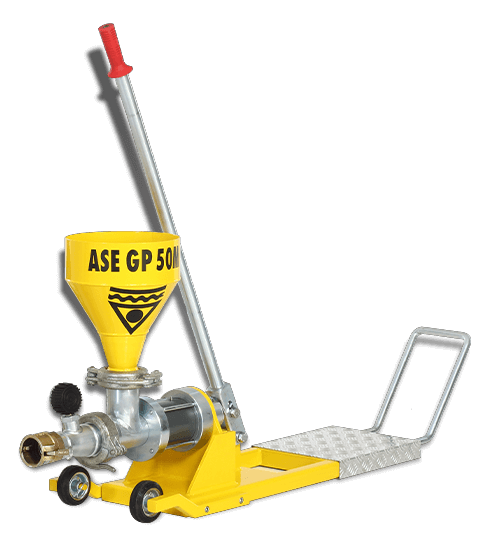 Contact Us
Contact Us
 Contact Us
Contact Us
ASE DEP 200 is a new generation screw pump with rotor-stator system designed for grouting and grout ...

ASE TEM 250 is a pre-mixed, extremely easy-to-use, practical screw pump designed especially for grou...

ASE GP 50 M is a portable, mobile, hand operated, positive displacement pulsating piston pump. Its l...

An injection machine, otherwise called an infusion shaping machine, is a machine utilized for assembling plastic items by infusing liquid plastic into a shape. The cycle begins by dissolving the plastic granules in a barrel warmed by power, then, at that point, the liquefied plastic is infused into the form utilizing a screw or smash injector.
When the plastic has cooled and hardened, the shape is opened, and the completed item is eliminated. Infusion shaping is an exceptionally proficient and savvy technique for efficiently manufacturing plastic items, and it is broadly utilized in the assembling of many items, including car parts, customer products, toys, and bundling materials.
A plastic injection machine is a sort of machine utilized for assembling plastic items by infusing liquid plastic into a shape. It comprises of a barrel, where the plastic granules are liquefied, and an infusion unit that infuses the liquid plastic into the shape.
The shape, commonly made of steel or aluminum, is clipped closed during the infusion cycle, and the plastic is permitted to cool and harden before the form is opened and the completed item is taken out. Infusion shaping is a profoundly proficient and practical technique for efficiently manufacturing plastic items, and it is generally utilized in the assembling of a large number of items, including auto parts, buyer merchandise, toys, and bundling materials.
The injection machine works by dissolving plastic granules in a barrel warmed by power. The dissolved plastic is then infused into a form utilizing a screw or smash injector. The form is clipped closed during the infusion interaction, and the plastic is permitted to cool and cement.
When the plastic has solidified, the form is opened, and the completed item is eliminated. The machine can be set to create various parts immediately and can run ceaselessly, making it exceptionally proficient and financially savvy for efficiently manufacturing plastic items.
An infusion forming machine is utilized to efficiently manufacture plastic items by infusing liquid plastic into a shape. It's usually used to make a large number of items like auto parts, purchaser products, toys, family things, clinical and bundling materials. It's a broadly utilized technique because of its proficiency, and cost-viability and its capacity to create high volume, complicated and precise items.
Infusion shaping is reasonable for high-volume creation, making complex shapes and calculations, tight resiliences, exact aspects, and top notch surface completions. It's likewise financially savvy for items that require a high volume of indistinguishable parts, making it a famous strategy for assembling auto parts, purchaser products, toys, family things and bundling materials. It is additionally appropriate for making items that require solidness, strength and intensity opposition.
While picking an infusion shaping machine, there are a few variables to consider, including:
Production volume: The size and sort of machine will rely upon the volume of items you want to deliver.
Item size and weight: The machine ought to have the option to deal with the size and weight of the item you are producing.
Material sort: The machine ought to be viable with the kind of plastic material you will utilize.
Clamping force: The machine ought to have enough cinching power to keep the shape shut during the infusion interaction.
Injection speed and pressure: The machine ought to have the option to infuse the plastic at the right speed and strain to guarantee appropriate filling of the shape.
Automation and control highlights: Consider the degree of computerization and control highlights you expect in the machine, for example, mechanical arm, temperature control, and security highlights.
Energy efficiency: Search for machines that are energy effective to decrease functional expenses.
Service and maintenance: Think about the accessibility of administration and support for the machine.
Financial plan: Pick a machine that is reasonably affordable for you and addresses your issues.
It's vital to find a provider who can direct you to the best machine for your particular necessities, and furthermore give preparing and backing to the machine.
There are a few sorts of infusion forming machines, including: water powered, electric, crossover, all-electric, and miniature infusion shaping machines. Pressure driven machines are the most well-known and reasonable for a large number of utilizations. While electric machines are energy-proficient and give exact control!
Cross breed and all-electric machines join the best highlights of water powered and electric machines. Miniature infusion forming machines produce little and miniature estimated parts, and multi-part infusion shaping machines can create various parts in a single embellishment cycle.
Injection and grouting pumps are machines used in construction and engineering to pump and inject various types of fluids, such as cement, grout, and chemicals, into concrete or soil. These pumps are commonly used in soil stabilization, foundation repair, tunneling, mining, and water control projects.
The three most important pieces of information about injection and grouting pumps are:
They are used to inject fluids into concrete or soil for various construction and engineering purposes.
They can pump and inject different types of fluids, including cement, grout, and chemicals.
They are commonly used in soil stabilization, foundation repair, tunneling, mining, and water control projects.
There are various types of injection and grouting pumps available in the market, each designed for specific purposes. Some of the most commonly used types are:
Piston Pumps: These pumps are designed to handle high-pressure applications and are used for injecting cement or other fluids into concrete or soil.
Diaphragm Pumps: These pumps are designed to handle abrasive and viscous materials and are used for injecting grout and other chemicals into soil or concrete.
Screw Pumps: These pumps are used for injecting cement, grout, or other viscous materials into concrete or soil.
Injection and grouting pumps offer various benefits in construction and engineering projects. Some of the benefits include:
Improved Stability: Injection and grouting pumps can be used to stabilize soil and concrete, ensuring better stability and safety.
Enhanced Durability: Injecting fluids into concrete or soil can help improve the durability of structures and reduce the need for frequent maintenance.
Cost-Effective: Using injection and grouting pumps can be a cost-effective solution compared to other methods, as it requires less labor and time.